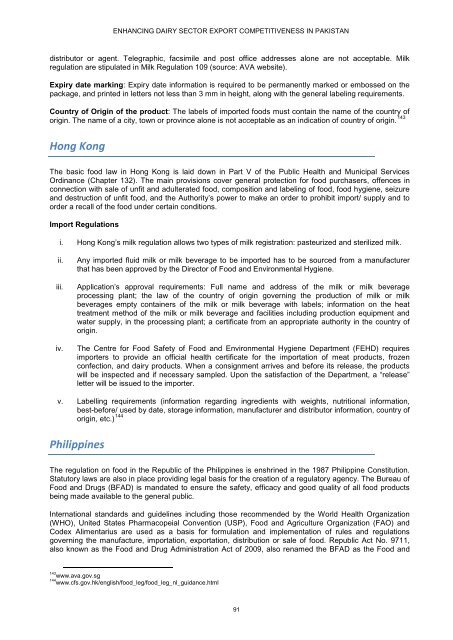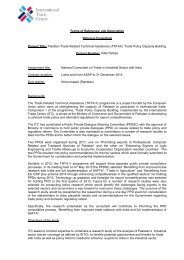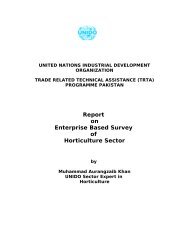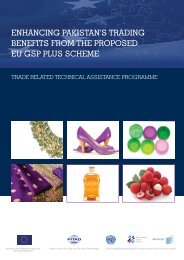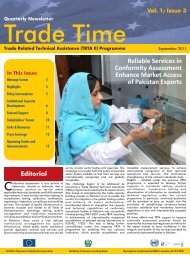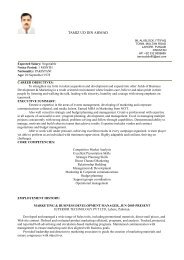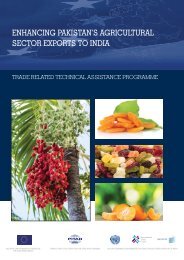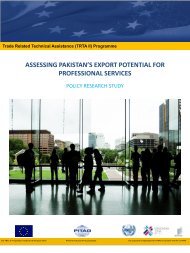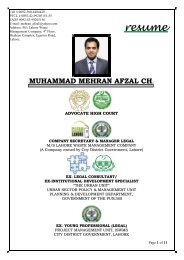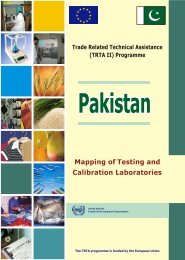Enhancing dairy sector export competitiveness - International Trade ...
Enhancing dairy sector export competitiveness - International Trade ...
Enhancing dairy sector export competitiveness - International Trade ...
Create successful ePaper yourself
Turn your PDF publications into a flip-book with our unique Google optimized e-Paper software.
ENHANCING DAIRY SECTOR EXPORT COMPETITIVENESS IN PAKISTANdistributor or agent. Telegraphic, facsimile and post office addresses alone are not acceptable. Milkregulation are stipulated in Milk Regulation 109 (source: AVA website).Expiry date marking: Expiry date information is required to be permanently marked or embossed on thepackage, and printed in letters not less than 3 mm in height, along with the general labeling requirements.Country of Origin of the product: The labels of imported foods must contain the name of the country oforigin. The name of a city, town or province alone is not acceptable as an indication of country of origin. 143Hong KongThe basic food law in Hong Kong is laid down in Part V of the Public Health and Municipal ServicesOrdinance (Chapter 132). The main provisions cover general protection for food purchasers, offences inconnection with sale of unfit and adulterated food, composition and labeling of food, food hygiene, seizureand destruction of unfit food, and the Authority’s power to make an order to prohibit import/ supply and toorder a recall of the food under certain conditions.Import Regulationsi. Hong Kong’s milk regulation allows two types of milk registration: pasteurized and sterilized milk.ii.iii.iv.Any imported fluid milk or milk beverage to be imported has to be sourced from a manufacturerthat has been approved by the Director of Food and Environmental Hygiene.Application’s approval requirements: Full name and address of the milk or milk beverageprocessing plant; the law of the country of origin governing the production of milk or milkbeverages empty containers of the milk or milk beverage with labels; information on the heattreatment method of the milk or milk beverage and facilities including production equipment andwater supply, in the processing plant; a certificate from an appropriate authority in the country oforigin.The Centre for Food Safety of Food and Environmental Hygiene Department (FEHD) requiresimporters to provide an official health certificate for the importation of meat products, frozenconfection, and <strong>dairy</strong> products. When a consignment arrives and before its release, the productswill be inspected and if necessary sampled. Upon the satisfaction of the Department, a “release”letter will be issued to the importer.v. Labelling requirements (information regarding ingredients with weights, nutritional information,best-before/ used by date, storage information, manufacturer and distributor information, country oforigin, etc.) 144PhilippinesThe regulation on food in the Republic of the Philippines is enshrined in the 1987 Philippine Constitution.Statutory laws are also in place providing legal basis for the creation of a regulatory agency. The Bureau ofFood and Drugs (BFAD) is mandated to ensure the safety, efficacy and good quality of all food productsbeing made available to the general public.<strong>International</strong> standards and guidelines including those recommended by the World Health Organization(WHO), United States Pharmacopeial Convention (USP), Food and Agriculture Organization (FAO) andCodex Alimentarius are used as a basis for formulation and implementation of rules and regulationsgoverning the manufacture, importation, <strong>export</strong>ation, distribution or sale of food. Republic Act No. 9711,also known as the Food and Drug Administration Act of 2009, also renamed the BFAD as the Food and143 www.ava.gov.sg144 www.cfs.gov.hk/english/food_leg/food_leg_nl_guidance.html91


